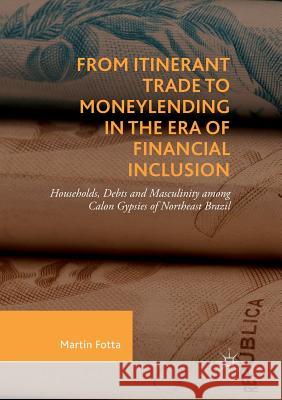From Itinerant Trade to Moneylending in the Era of Financial Inclusion: Households, Debts and Masculinity Among Calon Gypsies of Northeast Brazil » książka
topmenu
From Itinerant Trade to Moneylending in the Era of Financial Inclusion: Households, Debts and Masculinity Among Calon Gypsies of Northeast Brazil
ISBN-13: 9783030071875 / Angielski / Miękka / 2018 / 250 str.
From Itinerant Trade to Moneylending in the Era of Financial Inclusion: Households, Debts and Masculinity Among Calon Gypsies of Northeast Brazil
ISBN-13: 9783030071875 / Angielski / Miękka / 2018 / 250 str.
cena 322,77
(netto: 307,40 VAT: 5%)
Najniższa cena z 30 dni: 308,41
(netto: 307,40 VAT: 5%)
Najniższa cena z 30 dni: 308,41
Termin realizacji zamówienia:
ok. 22 dni roboczych
Bez gwarancji dostawy przed świętami
ok. 22 dni roboczych
Bez gwarancji dostawy przed świętami
Darmowa dostawa!
Kategorie:
Kategorie BISAC:
Wydawca:
Palgrave MacMillan
Język:
Angielski
ISBN-13:
9783030071875
Rok wydania:
2018
Wydanie:
Softcover Repri
Ilość stron:
250
Waga:
0.32 kg
Wymiary:
21.01 x 14.81 x 1.4
Oprawa:
Miękka
Wolumenów:
01
Dodatkowe informacje:
Wydanie ilustrowane











